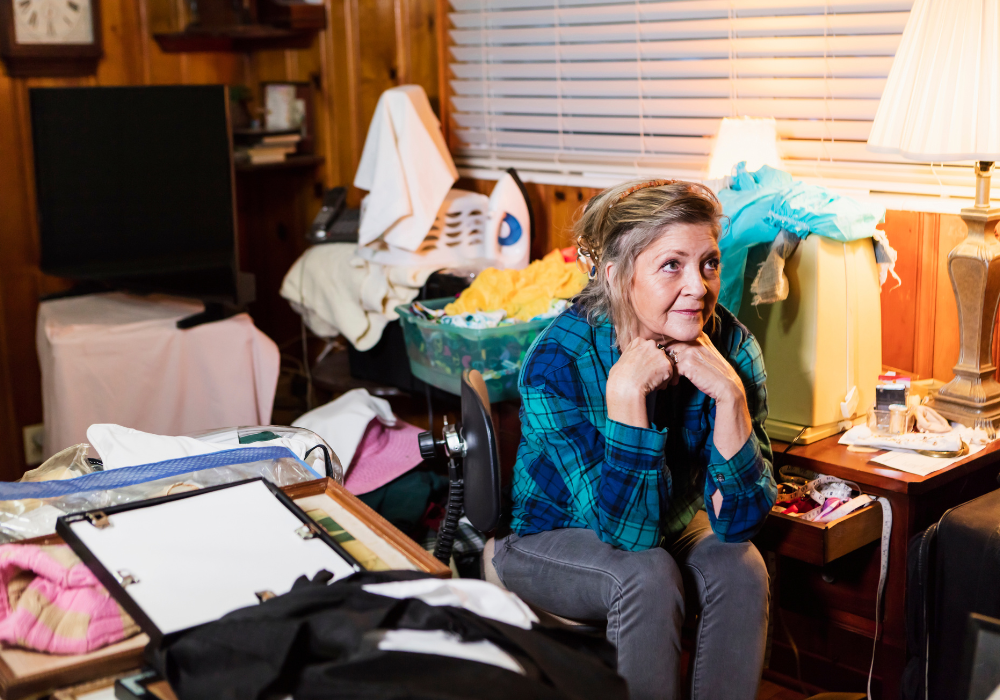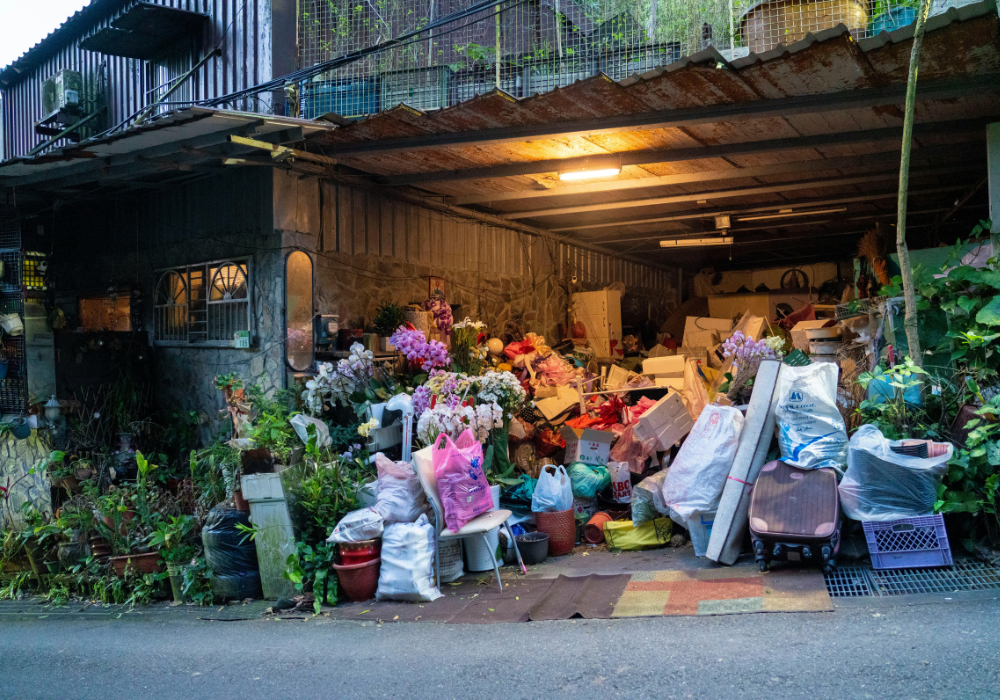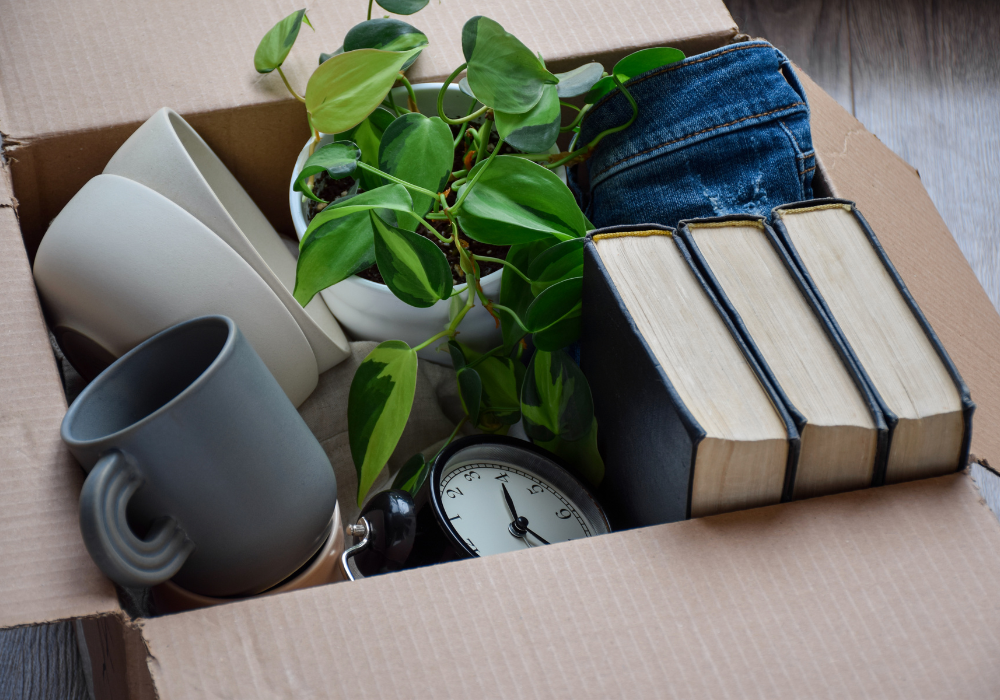Experts say breaking free from clutter is more mental than physical—and here’s proof.

Going from hoarding to minimalism might sound like jumping from one extreme to another—but it’s more possible than you think. It doesn’t start with a trash bag or a storage unit. It starts with your mindset. Hoarding isn’t just about stuff—it’s about fear, comfort, identity, and control. And shifting those deep-rooted beliefs takes time, patience, and a whole lot of self-compassion. But here’s the good news: change is absolutely possible.
You don’t have to become a hyper-organized minimalist overnight. You just need to start thinking differently about what you keep and why. These mindset changes can help anyone stuck in the clutter shift toward a life with more clarity, peace, and freedom—without losing who they are in the process.
1. You stop believing that every item might be useful someday.

That “just in case” mentality feels smart—until it turns your home into a storage unit. One of the biggest mindset shifts is realizing that most of those things you’re saving for a rainy day never get used.
Instead of feeling resourceful, you end up drowning in stuff that’s more stressful than helpful. When you start to accept that letting go doesn’t mean you’ll be unprepared, it’s a game-changer.
Minimalists trust that if they do need something later, they’ll find a way. You don’t need to keep a broken blender for five years—you need breathing room now.
2. You realize memories aren’t stored in objects—they’re stored in you.

Hoarders often hang on to things because they’re emotionally tied to memories. But here’s the truth: your grandma’s teacups aren’t the memory—you are. The stuff might trigger a feeling, but the connection lives in your heart, not your closet.
Shifting your thinking here is huge. You can honor the past without keeping everything it left behind. Maybe you keep one photo or one keepsake instead of ten dusty boxes.
Minimalists cherish the sentiment, but don’t let it clutter their lives. You don’t have to hold onto everything to remember what truly matters.
3. You stop confusing clutter with comfort and security.

It’s easy to convince yourself that being surrounded by stuff means you’re safe and protected. But eventually, all that “comfort” turns into anxiety and overwhelm. Hoarders often fear emptiness, so they fill every corner.
But when you shift to a minimalist mindset, you realize space can also feel safe. A clear room can be calming, not cold. It’s about redefining what comfort looks like. Minimalists find security in clarity, not chaos.
You don’t need to build a fortress of forgotten items around yourself—you just need peace, and that usually starts with letting go of what’s weighing you down.
4. You learn that needing less is more empowering than owning more.

Minimalism flips the script. Instead of being proud of what you accumulate, you start feeling proud of what you don’t need. That’s a radical shift for a hoarder who equates worth with having more. But freedom comes when you realize your value isn’t tied to your possessions.
The fewer things you rely on, the less stress and maintenance you carry. You begin to understand that simplicity isn’t about lack—it’s about control.
You’re not giving up power—you’re taking it back. You become someone who isn’t owned by their stuff, and that’s where real strength shows up.
5. You stop thinking everything you own needs to be saved.

Some items really have run their course, and keeping them doesn’t preserve their value—it just adds to the mess. Hoarders often believe they’re being respectful or responsible by saving everything.
But a minimalist learns that honoring something doesn’t always mean holding onto it. Sometimes the most respectful thing you can do is let something go with gratitude. Broken furniture, outdated electronics, and piles of old papers don’t serve you anymore.
Learning to release what’s no longer useful, even if it once mattered, is a huge mental leap—and a liberating one.
6. You stop fearing regret and start embracing clarity.

The fear of letting go and later regretting it can be paralyzing. “What if I need it again?” plays like a broken record in a hoarder’s mind. But a minimalist learns that clarity is worth more than clinging to every maybe.
Sure, you might miss something you toss. But you’ll gain space, mental peace, and confidence. It’s not about being reckless—it’s about trusting yourself.
You begin to see that most of what you’re afraid to lose, you barely remember owning anyway. Regret might come once in a while, but the relief that follows is way more powerful.
7. You realize you’re not responsible for saving everything—or everyone.

Hoarders often feel like gatekeepers of family history, community resources, or household supplies. But that burden becomes overwhelming fast. One powerful shift is understanding that you don’t have to be the archive, the fixer, or the backup plan for everyone else.
You’re allowed to let go without guilt. Minimalists understand that the world won’t fall apart if they don’t keep extra buttons, outdated books, or their cousin’s baby clothes from 1989.
You can care deeply and still choose peace over pressure. Letting go isn’t abandonment—it’s self-respect with boundaries.
8. You stop equating your identity with your belongings.

When your stuff becomes who you are, the idea of letting go feels like losing yourself. But it’s not your high school trophies, overflowing closet, or hobby gear that define you—it’s your values, your actions, and how you live.
Minimalists know that identity is internal, not stored on shelves. Once you understand that, the fear around decluttering starts to fade. You’re not throwing away you—you’re just clearing space to see yourself more clearly.
The less clutter you carry, the easier it is to figure out what truly reflects your life now, not who you were twenty years ago.
9. You understand that stuff isn’t love—and letting go isn’t betrayal.

Many hoarders hold onto things that belonged to loved ones because it feels like a way to stay close to them. But the truth is, your connection isn’t inside a box in the attic—it’s in your heart, your memories, and how you live their legacy.
Letting go doesn’t mean forgetting. It doesn’t mean you didn’t care. It just means you’re choosing presence over pressure.
Minimalists can still be sentimental—they just don’t let grief anchor them to piles of things. Love doesn’t live in the object. It lives in you, and it doesn’t need clutter to prove it.
10. You stop thinking of decluttering as a one-time event.

Minimalism isn’t a weekend project—it’s a mindset you carry with you every day. Hoarders often try to “clean up” with one big purge, then end up right back where they started.
But when your thinking shifts, you begin to see that letting go is a lifestyle, not a checklist. You question what you bring in, not just what you throw out. Every purchase becomes intentional. Every object gets evaluated. It’s slow at first, but it builds momentum.
Over time, your environment stays manageable—not because you’re working harder, but because your habits and mindset are finally aligned.
11. You finally believe you deserve a calm, uncluttered life.

At the heart of hoarding is often a deep belief that you need the chaos or don’t deserve peace. But when your mindset starts to shift, you realize you are worthy of a home that soothes instead of stresses.
Minimalists don’t live in perfect spaces—they live in purposeful ones. You’re allowed to have surfaces that aren’t buried and closets that don’t burst open.
You’re allowed to feel good in your space. That belief—however small it starts—is what fuels every other change. Because once you believe you deserve better, you stop settling for the mess.
